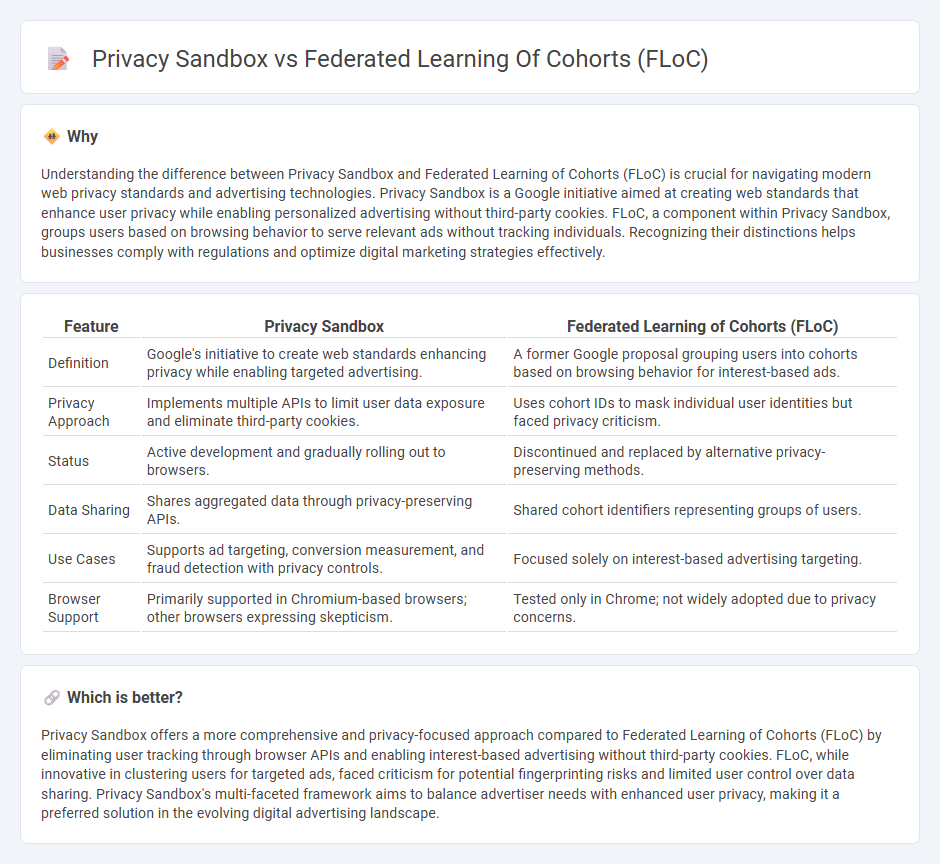
Privacy Sandbox and Federated Learning of Cohorts (FLoC) represent Google's initiatives to enhance user privacy while enabling targeted advertising by eliminating third-party cookies. Privacy Sandbox introduces a set of APIs that allow advertisers to gather aggregated data without exposing individual user identities, whereas FLoC clusters users into cohorts based on browsing behavior to anonymize personal data during ad targeting. Explore the differences and implications of these privacy-centric technologies to understand their impact on digital advertising.
Why it is important
Understanding the difference between Privacy Sandbox and Federated Learning of Cohorts (FLoC) is crucial for navigating modern web privacy standards and advertising technologies. Privacy Sandbox is a Google initiative aimed at creating web standards that enhance user privacy while enabling personalized advertising without third-party cookies. FLoC, a component within Privacy Sandbox, groups users based on browsing behavior to serve relevant ads without tracking individuals. Recognizing their distinctions helps businesses comply with regulations and optimize digital marketing strategies effectively.
Comparison Table
| Feature | Privacy Sandbox | Federated Learning of Cohorts (FLoC) |
|---|---|---|
| Definition | Google's initiative to create web standards enhancing privacy while enabling targeted advertising. | A former Google proposal grouping users into cohorts based on browsing behavior for interest-based ads. |
| Privacy Approach | Implements multiple APIs to limit user data exposure and eliminate third-party cookies. | Uses cohort IDs to mask individual user identities but faced privacy criticism. |
| Status | Active development and gradually rolling out to browsers. | Discontinued and replaced by alternative privacy-preserving methods. |
| Data Sharing | Shares aggregated data through privacy-preserving APIs. | Shared cohort identifiers representing groups of users. |
| Use Cases | Supports ad targeting, conversion measurement, and fraud detection with privacy controls. | Focused solely on interest-based advertising targeting. |
| Browser Support | Primarily supported in Chromium-based browsers; other browsers expressing skepticism. | Tested only in Chrome; not widely adopted due to privacy concerns. |
Which is better?
Privacy Sandbox offers a more comprehensive and privacy-focused approach compared to Federated Learning of Cohorts (FLoC) by eliminating user tracking through browser APIs and enabling interest-based advertising without third-party cookies. FLoC, while innovative in clustering users for targeted ads, faced criticism for potential fingerprinting risks and limited user control over data sharing. Privacy Sandbox's multi-faceted framework aims to balance advertiser needs with enhanced user privacy, making it a preferred solution in the evolving digital advertising landscape.
Connection
Privacy Sandbox is Google's initiative to enhance web privacy by reducing cross-site tracking while maintaining ad relevance, and Federated Learning of Cohorts (FLoC) is one of its key proposals. FLoC groups users into anonymized cohorts based on browsing behavior to replace individual tracking with privacy-preserving interest-based advertising. Both technologies aim to balance user privacy with advertiser needs by shifting data processing from individual user profiles to aggregated group signals.
Key Terms
Third-party cookies
Federated Learning of Cohorts (FLoC) enables interest-based advertising by grouping users into cohorts, reducing reliance on individual third-party cookies for tracking. The Privacy Sandbox initiative further aims to phase out third-party cookies entirely by introducing privacy-preserving APIs like FLoC, FLEDGE, and Topics API to balance user privacy with ad targeting needs. Explore the evolving landscape of ad technologies to understand how these innovations protect user data while maintaining online advertising effectiveness.
User anonymization
Federated Learning of Cohorts (FLoC) clusters users based on browsing behavior to enable targeted advertising while preserving user anonymity by assigning cohort IDs instead of individual identifiers. Privacy Sandbox extends this concept by introducing multiple APIs designed to provide robust privacy protections, combining techniques like on-device processing and differential privacy to enhance user anonymization further. Explore how these evolving technologies balance personalized experiences with privacy safeguards to understand the future of user data protection.
Ad targeting
Federated Learning of Cohorts (FLoC) groups users into large cohorts based on browsing behavior to enable interest-based ad targeting while preserving individual privacy by processing data on-device. Google's Privacy Sandbox encompasses FLoC and broader initiatives, offering APIs designed to replace third-party cookies with privacy-preserving mechanisms such as Topics and FLEDGE, enhancing transparency and control in ad targeting. Explore detailed comparisons and the latest developments in Privacy Sandbox technologies to understand their impact on digital advertising.
Source and External Links
Definition Federated Learning of Cohorts - Federated Learning of Cohorts (FLoC) is a privacy-focused machine learning method where users are grouped into anonymized cohorts based on similar browsing behaviors, allowing analysis and targeted advertising without examining individual data and enhancing user privacy.
WICG/floc: This proposal has been replaced by the Topics ... - GitHub - FLoC uses browser-based machine learning to assign users to cohorts derived from their browsing history, sharing only the cohort ID via a JavaScript API without transmitting individual data, but the project has been superseded by newer proposals.
Federated Learning of Cohorts (FLoC) - FLoC is designed to protect privacy by grouping users with similar browsing interests into large cohorts of thousands who remain anonymous, so advertisers can serve relevant ads without tracking individuals across the web or sharing personal browsing history outside the browser.
 dowidth.com
dowidth.com